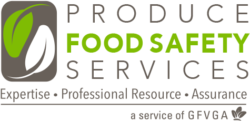Regulatory.
Food Safety is the Law.
it is also good business.
PFSS Food Safety Specialists can guide you through the multitude of state and federal requirements that govern food production and handling.

The FDA Food Safety Modernization Act (FSMA) was signed into law on January 4, 2011. Its purpose is to ensure the U.S. food supply is safe by shifting the focus from responding to contamination to preventing it. FSMA prompted FDA to create a multitude of rules and regulations which impact state and local regulations affecting food and worker safety in agricultural operations.
Your experienced PFSS Food Safety Specialists are your on-call resource to guide, advise, and help you navigate these regulations. We are also here for you as a professional resource for information on food safety programs and requirements.
FEDERAL REGULATION
The Food Safety Modernization Act (FSMA) established regulations and governs food safety practices across the United States. It is also the foundation for most state and local food safety regulations. These links will take you to the full text of the FSMA, along with FDA guidance for compliance.
The FDA’s Produce Safety Rule sets the standards for the growing, harvesting, packing and holding of produce for human consumption. The Produce Safety Alliance is a collaboration between Cornell University, FDA and USDA to help growers meet the regulatory requirements of the Produce Safety Rule.
The Preventive Controls Rule for Human Food is the modernization of long-standing good manufacturing practice requirements. It also adds requirements for domestic and foreign facilities to establish and implement hazard analysis and risk-based preventive controls for human food. The Food Safety Preventive Controls Alliance (FSPCA) is a public-private alliance of key industry, the FDA, and the Illinois Institute of Technology’s Institute for Food Safety and Health.
The FSMA rule on Sanitary Transportation of Human and Animal Food regulates and codifies FDA’s efforts to protect foods from farm to table by keeping them safe from contamination during transportation.
Aimed at preventing intentional adulteration from acts intended to cause wide-scale harm to public health, this rule requires mitigation and risk reducing strategies for processes in certain registered food facilities.
This rule requires that importers perform certain risk-based activities to verify that food imported into the United States has been produced in a manner that meets applicable U.S. safety standards.
This proposed rule would establish additional traceability recordkeeping requirements (beyond what is already required in existing regulations) for persons who manufacture, process, pack, or hold foods the FDA has designated for inclusion on the Food Traceability List. If enacted, the rule will help the FDA rapidly and effectively identify recipients of potentially contaminated foods to prevent or mitigate foodborne illness outbreaks.
STATE REGULATION
The Georgia Department of Agriculture has developed programs to protect consumers’ health by ensuring that food in Georgia is prepared in a clean environment and is honestly presented.
To ensure the safety of tomatoes to consumers, Florida tomatoes are subject to mandatory state inspection and audit for handling, production and packing. The Florida Tomato Committee is a Federal Marketing Order regulating the handling of tomatoes and has authority over the tomatoes grown in Florida.

